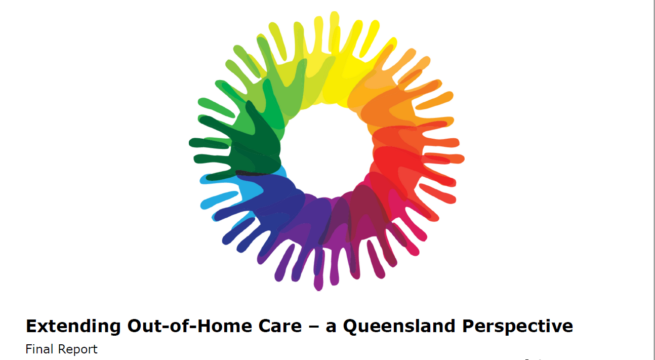
NEW REPORT FINDS EXTENDING QUEENSLAND FOSTER CARE TO 21 YEARS WOULD DRAMATICALLY IMPROVE VULNERABLE LIVES PLUS SAVE THE ECONOMY $407 MILLION
Media Release embargoed until 22 OCTOBER 2021
A new, independent report from Deloitte Access Economics released today, has found that extending foster care government support from 19 years to 21 years would significantly improve the lives of vulnerable young Queensland care-leavers and save the economy a staggering $407.8 million dollars over 10 years.
The report titled ‘Extending Out-of-Home Care – a Queensland Perspective’, analyses likely outcomes if care was extended to 21 years for care-leavers in terms of housing, education and employment, early parenthood, hospitalisation, costs of mental illness and smoking, interaction with the justice system and drug dependency. It found that extending the out-of-home care program to 21 years has a financial return of $3.30 for every $1 spent. When taking in both financial and wellbeing costs, the Home Stretch program in Qld will return $5.90 for every $1 spent.
Six out of eight Australian state and territory governments are now supporting young people in foster care with the choice of extended care to 21 years, as do the US, UK, NZ and many parts of Europe. In Queensland, care is terminated at the age of 19 years and 18 for those in residential care. In New South Wales care ends at 18 years.
Paul McDonald, Chair of the Home Stretch national coalition of over 200 community and child welfare organisations, said significant improved outcomes for care-leavers and financial gains cannot be ignored. He is urging the Queensland Government to join the Home Stretch system reform.
“We know that evicting young people from care too early often results in very disturbing life outcomes. 30% are jobless and homeless within a year. Many suffer mental health problems, are hospitalised, become drug dependent, pregnant, suicide or end up in jail,” said Mr McDonald.
“You wouldn’t ditch your own children, particularly in the midst of a global pandemic, and the government – as the legal ‘parent’ of foster children – shouldn’t either. This new Deloitte Report proves that not only is extending care to 21 years the right thing to do for these young people who’ve had it tough, but it makes good economic sense too. As most of the rest of Australia has realised, extending care to 21 is a no brainer.”
The report found that to “do nothing” or not extend care to 21 years would cost the Queensland Government $70.9m over the next 10 years and the Australian Government a further $336.8m.
According to the report: “The findings indicate it is a worthwhile investment for the Queensland Government to fund extended care to 21 years of age in Queensland as the overall value of benefit to government clearly exceeds the cost of this investment.” 8
Read the full Deloitte Report here.
Read about the Home Stretch reforms in each state and territory here.
For more information visit thehomestretch.org.au
MEDIA SPOKESPEOPLE AVAILABLE FOR INTERVIEW
- Paul MacDonald – National Chair Home Stretch coalition
- Teena Ingram – Co Chair Home Stretch Queensland committee
- Luke Condon – Partner Deloitte Access Economics
- Young people and carers who have been in the foster care system
FOSTER CARE FACTS & STATS
- The term ‘foster care’ relates to all children in formal and informal out-of-home care; whether they are in state foster care, relative/kinship care or residential care.
- Prior to the Home Stretch reform, state and territory governments began transitioning foster kids out of care when they turn 15 years. At 18, all support stopped.
- Over 47,000 Australian children are currently in the state care system (9,107 in Queensland Re: https://www.aihw.gov.au/reports/child-protection/child-protection-australia-2017-18/contents/data-visualisations/number-of-children-in-the-child-protection-system)1
- 3,000 Australian children leave the foster care system every year (733 in Queensland (Ref: https://www.cyjma.qld.gov.au/about-us/performance-evaluations/our-performance/ongoing-intervention-phase-permanency-planning/exiting-out-home-care)
- Within the first year of children leaving foster care2,3
- 30% are homeless
- 46% of boys and 22% of girls are in the criminal justice system
- 54% have mental health issues
- 17% are pregnant during adolescence
- 30% are unemployed
- COVID-19 pandemic impacts on vulnerable young people4:
- An additional 4,500 children are estimated to enter foster care.
- The rate of children entering out-of-home care is growing by 10% per year.
- Extending foster care to 21 will save Australian Governments $2.4 billion over 10 years5.
- Extending care to 21 will save the Queensland Government $70.9m over 10 years8
- Extending foster care to 21 will save the NSW Government $222m over 10 years3.
- For every $1 invested in extending foster care to 21 years in Qld, society benefits by $5.90 in3:
- reduced crime (16.3% ↓ 10.4%)
- reduced mental health care (54.4% ↓ 30.8%)
- reduced drug and alcohol dependency (15.8% ↓ 2.5%)
- reduced hospitalisations (29.2% ↓ 19.2%)
- reduced homelessness (39% ↓ 19.5%)
- reduced teen pregnancies (16.6% ↓ 10.2%)
- increased further education (4.5% ↑ 10.4%)
REFERENCES:
1 Australian Institute of Health and Welfare (2018)
3Deloitte Report: Extending Care to 21 Years in NSW 2018
6Nous evaluation of Extended Care to 21 years trial by Uniting NSW.ACT
7 Home Stretch Reach Tel Survey (2017)
8 Deloitte Access Economics: Extending Out of Home Care – a Queensland Perspective
